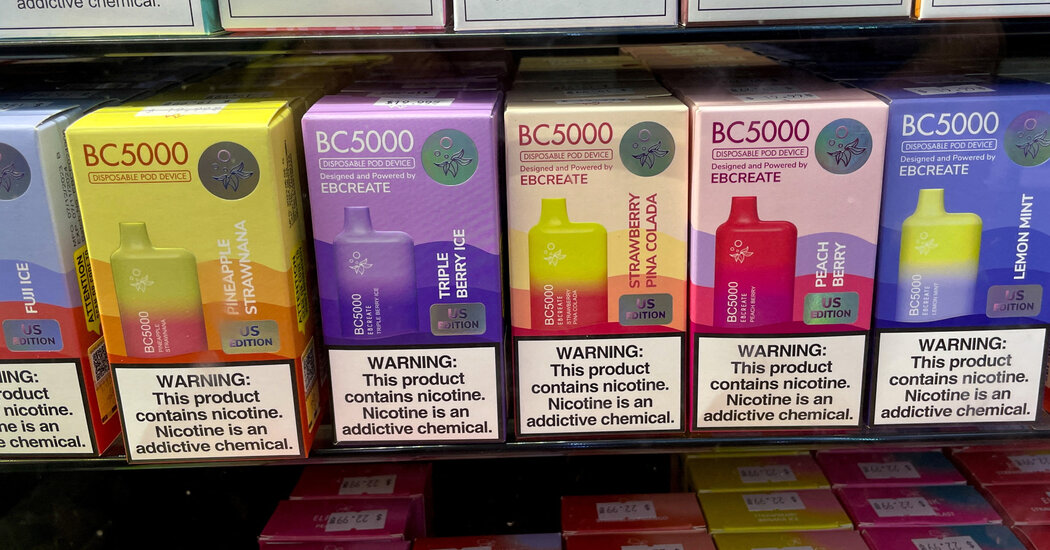
A multi-agency coalition of law enforcement agents will begin tackling the unruly market of illegal e-cigarettes, under pressure from antismoking groups, lawmakers and the tobacco industry urging federal authorities to stop the flood of vaping devices favored by adolescents.
The Justice Department announced the new effort, which is expected to target fruit- and candy-flavored vapes containing high levels of addictive nicotine.
The new coalition would include the Bureau of Alcohol, Tobacco, Firearms and Explosives; the U.S. Marshals Service; the Federal Trade Commission and the U.S. Postal Service, tapping into federal laws that could include significant fines and jail terms. “Unauthorized e-cigarettes and vaping products continue to jeopardize the health of Americans — particularly children and adolescents — across the country,” Benjamin C. Mizer, the acting associate attorney general, said.
Until now, enforcement efforts have largely involved warning letters and limited penalties issued by the Food and Drug Administration to various vendors like gas station and convenience store owners, ordering them to stop selling the items.
Those F.D.A. initiatives have been criticized as unsuccessful by congressional lawmakers and others, who have pushed the agency to do more to keep illegal e-cigarettes from entering the United States.
Traditional tobacco companies, including Reynolds American, have also asked the F.D.A., which regulates tobacco, to banish the illicit products that are in competition with their own e-cigarettes. Their call for flavored vape enforcement, though, has ended at the U.S. border. British American Tobacco, Reynolds’ parent company, has said it marketed its Vuse Go vapes in flavors like Mango Ice and Blue Raspberry in 46 countries.
Adolescent vaping rates have fallen from peak levels reported in national surveys of teenagers about five years ago. But public health experts are still concerned about the dangers of nicotine addiction on the adolescent brain, with many illicit products carrying unknown levels and undisclosed chemicals.
Senator Dick Durbin, Democrat of Illinois and majority whip, is holding a hearing of the Judiciary Committee on Wednesday to focus on combating youth vaping and improving enforcement. Top Justice Department and F.D.A. officials were invited to testify.
“I’m glad my calls for greater enforcement against unauthorized e-cigarettes have been heeded and that more resources are on the way to address the flood of illegal products entering the market,” Mr. Durbin said in a statement Monday. “I hope this brings meaningful change — the health of our kids depends on it.”
Public health groups also welcomed the new effort.
“Law enforcement needs to be there to get products off the market, and that needs to happen right away,” said Erika Sward, assistant vice president of advocacy at the American Lung Association. “There’s a reason these products are not legal for sale in the United States, and that’s because they are very appealing to kids.”
The proliferation of high-volume vapes in a vast array of flavors — like Strawberry Ice Cream, Hawaii Punch and Juicy Peach — has angered antismoking organizations. In the most recent annual government survey, about 10 percent of high school students and nearly 5 percent of middle school students reported vaping in the last month.
Those young people report a strong preference for flavors in surveys and have said in interviews that they enjoy trying and sharing novel blends. As of the end of 2023, about 6,000 unique varieties of vapes were sold on the U.S. market, according to data provided by the C.D.C. Foundation, a nonprofit that supports the Centers for Disease Control and Prevention. Flavored vape sales have surged in recent years, to nearly $400 million at the end of 2023 from about $217 million in early 2020.
Also during that time, vape devices have gotten larger, offering high levels of nicotine and up to 8,500 puffs per device, drawing comparisons with a cigarette carton’s amount of nicotine.
So far, the F.D.A. has authorized the sale of a short list of 23 tobacco-flavored vaping items, which include NJOY by Altria as well as Vuse products made by R.J. Reynolds Vapor Company.
The agency is still reviewing Juul’s applications for vapes, and last week the F.D.A. lifted an earlier order that would have denied permission for the company to sell its devices.
Legacy tobacco companies have — albeit awkwardly — aligned with public health groups in calling on the F.D.A. to ramp up its battle against illegal vapes, which dominate the market in overall sales.
On Monday, Reynolds applauded the F.D.A.’s move. “While the FDA has sent warning letters to companies responsible for some illegal vapes, the biggest issue is lack of comprehensive enforcement,” according to a statement by the company’s spokesman, Luis Pinto. “More must be done to intercept and seize illegal disposable vapes, protect public health, and prevent youth access.”
The Campaign for Tobacco-Free Kids also applauded the creation of a new law enforcement unit and called for product seizures, import restrictions and criminal prosecutions.
“This move will only have an impact if it is immediately followed with concrete and comprehensive enforcement actions,” Yolanda C. Richardson, the campaign’s president, said.